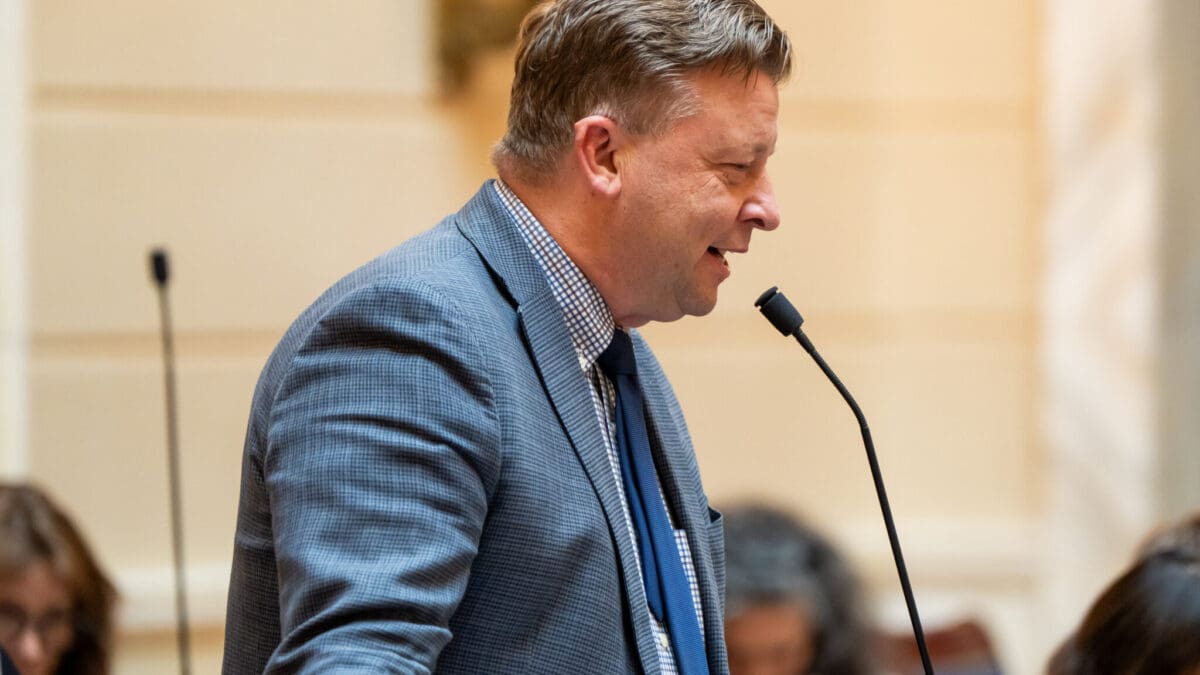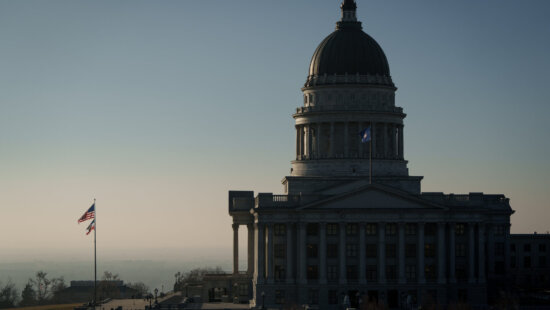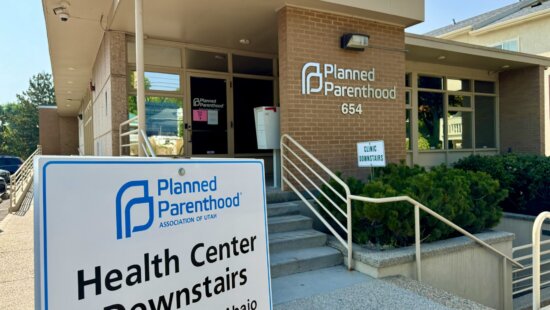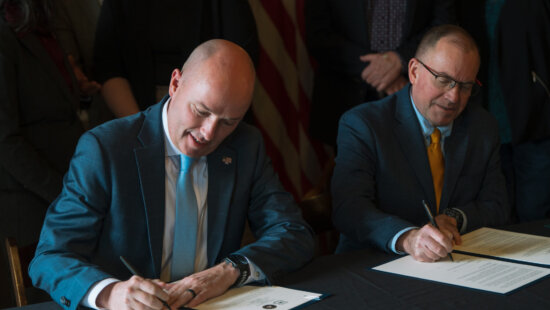Politics
Utah ‘religious freedom’ bill advances to Senate

Sen. Todd Weiler, R-Woods Cross, speaks in the Senate Chamber at the Capitol in Salt Lake City on Friday, Jan. 26, 2024. Photo: Spenser Heaps for Utah News Dispatch
After West Virginia, Utah could be next to codify Religious Freedom Restoration Act on state level
By: Katie McKellar, Utah News Dispatch
Utah may be the next state to adopt its own version of the Religious Freedom Restoration Act to allow Utahns to challenge government regulations they believe interfere with their constitutional right to religious freedom.
The bill, SB150, easily cleared its first legislative hurdle on Monday, winning endorsement from a Senate committee on a 5-0 vote. It now goes to the full Utah Senate.
The bill is modeled after a similar measure that recently won approval in West Virginia, described by supporters as a tool to protect religious freedom. West Virginia’s GOP-controlled Legislature and Republican governor approved the bill despite concerns from Democrats that the proposal could be used to discriminate against LGBTQ+ people and other marginalized groups, the Associated Press reported.
The Utah bill’s sponsor, Sen. Todd Weiler, R-Woods Cross, described it as a bill modeled after West Virginia’s legislation and laws already adopted in about two dozen other states to codify in state code current federal religious freedom protections if Congress were to ever repeal the Religious Freedom Restoration Act.
“This would give us at least a backstop on the state level,” Weiler told the Senate Economic Development and Workforce Services Committee on Monday.
Debate over the Religious Freedom Restoration Act
The federal Religious Freedom Restoration Act was approved in 1993 to allow federal regulations that clash with religious beliefs to be challenged.
Today RFRA remains in place, but advocacy groups including the Human Rights Campaign — the largest LGBTQ+ political lobbying organization in the U.S. — say even though it was designed to protect religious freedom, some have “distorted RFRA into a blank check to discriminate or to impose their religious beliefs on others.”
The Human Rights Campaign supports the proposed Do No Harm Act to clarify RFRA is “intended to protect religious freedom without allowing the infliction of harm on other people.” Opponents of the Do No Harm Act worry it would actually do more harm than good by limiting religious protections and making it harder for people to exercise their freedom of religion in businesses or other public spheres.
SB150 would ban Utah government entities from being able to “substantially burden” a person’s constitutional right to freedom of religion unless doing so is “essential to furthering a compelling governmental interest.”
Side-stepping abortion
The bill mirrors almost word-for-word the law West Virginia passed last year, Weiler said. “We’re not trying to reinvent the wheel.”
However, unlike West Virginia’s legislation, Weiler’s bill now does not include a provision that would have prohibited using religious freedom protections to seek an abortion.
An earlier version of Weiler’s bill would have banned anyone from using the legislation to “justify ending the life of an individual, including ending the life of an unborn child.” But in response to concerns from Democrats including Sen. Karen Kwan, D-West Valley City, Weiler agreed to strip out the abortion-related language, saying he doesn’t want to “pick at scabs” over an “emotional issue.”
“I’m not trying to wade into the abortion debate with this,” Weiler said. “It’s the same concept but it sidesteps the abortion issue.”
After Weiler removed the language, Kwan voted in favor of the bill during Monday’s committee meeting.
Arguments for and against
Stan Rasmussen, vice president of government affairs for the conservative-leaning Sutherland Institute, spoke in favor of Weiler’s bill. He read a statement by William Duncan, the institute’s constitutional law and religious liberty fellow, calling the legislation an “opportunity” for Utah lawmakers to “proactively enact protections for the constitutional right of free exercise of religion, particularly for religious minorities.”
“It gives clear directions to government entities so that many potential conflicts can be avoided, and to state courts about how to resolve the conflicts if they arise,” Rasmussen said.
Speaking in opposition to the bill, Ellie Menlove, legislative and policy counsel for the American Civil Liberties Union of Utah, said even though the ACLU of Utah supports Weiler’s efforts to “protect the right of religious exercise” for Utahns, the group is concerned that it could result in “inadvertent consequences and result in discrimination.”
“In practice, the law could allow individuals to claim their religious beliefs (and) give them the right to ignore laws including nondiscrimination, child abuse and domestic violence laws,” Menlove said.
“For example, the bill may allow a police officer to (claim) his religious beliefs when refusing to defend a synagogue or a mosque,” she said. “Or a man could claim domestic violence laws don’t apply to him if his religious beliefs teach that a husband can discipline his family or his wife in any way he sees fit.”
Menlove said it could also allow a landlord to refuse to rent to a same-sex couple, a single mother or an unmarried couple. “Or a guidance counselor could refuse to counsel a student that’s gay or trans if it’s against the counselor’s religious beliefs,” she said.
“While we absolutely recognize the good intent of the bill’s sponsor,” Menlove said, “we have to oppose any bill that would put an individual’s religious belief ahead of the common good.”
In response to the ACLU’s concerns, Weiler said the bill would simply mirror in Utah code what’s already in place on the federal level.
“I understand the concerns,” he said. “I just don’t think by emulating federal law we’re going to create a problem that isn’t already there.”
No other LGBTQ+ advocates weighed in on Weiler’s bill during Monday’s public hearing. However, Marina Lowe, policy director for Equality Utah, the state’s largest LGBTQ+ advocacy organization, told Utah News Dispatch in a text message “we definitely have concerns.”
Weiler has more nuanced views than many of his colleagues when it comes to LGBTQ+ issues. He’s among a handful of Utah Republicans who voted against a controversial bill approved by the Utah Legislature last week to restrict transgender people from accessing government-owned bathrooms and locker rooms that match their gender identities unless they’ve undergone surgery and legally changed their birth certificates.




















